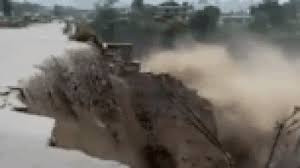Understanding Dehradun Flash Floods: Causes and Consequences

Introduction
In recent weeks, Dehradun has experienced flash floods, highlighting the urgent need for disaster preparedness and management in the region. These weather events underscore the impact of climate change and mismanagement of urban areas, raising concerns among locals and officials alike. Understanding the causes and consequences of these floods is crucial for future prevention and response strategies.
The Events Unfold
In early October 2023, continuous rainfall led to sudden flash floods in and around Dehradun. The India Meteorological Department recorded over 100 mm of rain in just 24 hours, causing rivers and drains to overflow. Significant areas were affected, with landslides blocking roads and numerous homes flooded. Emergency services were mobilized to rescue stranded individuals and provide assistance to those affected.
The authorities reported at least five fatalities linked to the floods, and many residents were displaced from their homes. The state government declared the situation as a natural disaster, activating relief measures and mobilizing resources for the affected communities.
Response and Recovery
In response to the devastation, local government agencies initiated immediate relief operations, distributing food, clean water, and other essentials to those in need. Relief camps have been set up in schools and community centers to provide temporary shelter to the displaced residents. The government also urged citizens to stay vigilant and avoid travel unless necessary, while continuously monitoring weather forecasts for further rainfall.
Looking Ahead
While the immediate aftermath of the floods is being addressed, addressing long-term resilience is equally important. Experts recommend improving drainage systems, reforesting catchment areas, and implementing stricter regulations on urban development in vulnerable zones. The state is also working on a comprehensive disaster management plan that involves better infrastructure and community awareness programs.
Conclusion
The flash floods in Dehradun serve as a reminder of the growing threats posed by extreme weather events exacerbated by climate change. The importance of preparedness, rapid response, and proactive planning cannot be overstated. For residents, staying informed and participating in local preparedness initiatives will be vital in the face of future adverse weather conditions. Moving forward, collaboration among government agencies, NGOs, and the community will be critical to enhancing resilience against such disasters.









